USC Norris Comprehensive Cancer Center
An NCI-designated Comprehensive Cancer Center
ACS Cancer Research Summer Undergraduate Internship Program
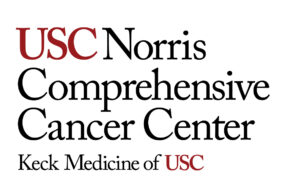
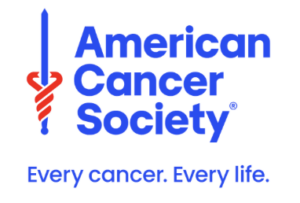
Open to rising Sophomores, Juniors, Seniors with an interest in STEM, Cancer and/or Biomedical Research.
This program provides research opportunities and career development for undergraduate students from communities historically not represented in biomedical research, per NIH definition.
About ACS Cancer Research Summer Undergraduate Internship Program:
Funded by the American Cancer Society, this internship program provides undergraduate students with hands-on research experience and career development activities that will help them prepare for a career in cancer research. Students will seek and identify an established faculty mentor based on mutual research interest and will create a research project proposal to be completed over the course of the program.
The USC Norris Comprehensive Cancer Center has available funds from ACS to provide $5,000 stipends for eight (8) undergraduate interns for the 10-week summer internship program. Please note additional funding to cover cost of living such housing, food, transportation, etc. is not available.
Interns accepted into the program will get a chance to experience working with a cancer research team that is focused on growth, learning, and exploration.
Components of our program include:
Interns spend 10 weeks during the summer engaging in hands-on research. They have the opportunity to explore a career in cancer research, and work on a research project that directly impacts communities and/or patients. In addition, they receive one-on-one mentorship by an accomplished investigator in a cancer research lab or in a clinical or community setting.
Interns receive a total of $5,000 for the summer internship. Additional funding to cover cost of living such as housing, food, transportation, etc. is not available. No academic credit is awarded.
Throughout the year, interns engage in planned, career-development and networking activities.
- Backgrounds Underrepresented in Biomedical Research: This program is open to students from backgrounds that are historically underrepresented in biomedical research per NIH definition.
- Academic Standing: Applicants must be rising sophomores, juniors, or seniors with an interest in any Science, Technology, Engineering, or Mathematics (STEM) field.
- GPA: A minimum GPA of 3.0 is required.
- Full-time Enrollment: Applicants must be enrolled full-time (at least 12 units per semester)
- No Concurrent Summer Classes: Students cannot enroll in summer courses while participating in the internship program.
- Degree Requirements: Applicants must not be graduating before the program ends.
Applications for the 2025 Internship Program are closed.
Q: How do I find a faculty mentor?
First Step: Once your eligibility form is approved by the Review Committee, start by reviewing the USC Cancer Center members page. If you know of a USC faculty member who is not a USC Cancer Center Member, but whose research is cancer focused, they are eligible for serve as your mentor. Contact two potential mentors via email and provide details about your interest in cancer research. Be sure to ask about available positions in their labs and any specific skills or training you would need. In your email, you should include:
- Explain the ACS Cancer Research Summer Undergraduate Internship Program.
- Do you have availability on your research team this summer for me to join?
- What skills will I learn?
- What kind of training will I need?
- What are your current research projects?
- What would my role be in your laboratory?
- I read about your research work in [topic] and I am really interested in learning more. Could you provide a few research papers where I could read more about this topic?
Second step: Once there is a mutual understanding between you and your mentor about your participation in their laboratory and/or on their research team, establish a research project and draft a proposal with your approved mentor.
Third step: Work with your mentor on your proposal and submit your Preliminary Research Proposal Form by 5:00 PM (PST) on Wednesday, March 26, 2025.
Fourth Step: If selected, submit your form by the Friday, April 11, 2025.
Q: When is the application deadline?
Eligibility Form: Due by 5:00 PM (PST) on Friday, February 14, 2025.
Preliminary Research Proposal: due by Wednesday, March 26, 2025, by 5 PM (PST)
Research Proposal: Due by 5:00 PM (PST) on Friday, April 11, 2025.
Q: How long is the internship?
The program is a 10-week summer internship that runs from late May to early August 2025. Students must not be enrolled in other summer classes during this time.
Q: How much is the stipend?
Interns will receive a $5,000 stipend for the summer. Additional funding for living expenses (housing, transportation, etc.) is not available.
Inspiring Journeys: Past Interns
2025
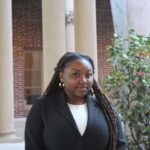
Aniya Harris
Aniya Harris, a Health Promotion and Disease Prevention student at USC, interned in the CHOICES Lab under Dr. Chanita Hughes-Halbert. Her project, Stress Reactivity, Nicotine Addiction, and Neighborhood Disadvantage Among Black and White Male Smokers, advanced her goal of integrating clinical practice, research, and community engagement to address health disparities. Her research poster was selected by ABRCMS 2025.

Celine Li
Celine Li, a Computational Neuroscience and Neural Engineering student at USC, gained hands-on experience in both preclinical and clinical research under the mentorship of Drs. Thomas Chen and Axel Schonthal, where she studied new therapeutic approaches for glioblastoma, one of the most aggressive forms of brain cancer. Her work spanned cell culture and animal models, providing valuable exposure to translational research methods that will inform her future academic and professional path.

Fibi Berhane
Fibi Berhane, a Global Health student at USC, spent her internship under Dr. Mariana Stern. Her project, Determinants of Generalized Self-Efficacy Among Hispanic/Latino Colorectal Cancer Patients in the ENLACE Study, examined social and demographic factors influencing self-efficacy in cancer patients, with the goal of informing tailored interventions to improve outcomes and participation in research trials among underserved populations.
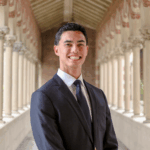
John Wehn
John Wehn, a Quantitative Biology student at USC, conducted research in Dr. Rongfu Wang’s Lab. His project, Small Molecule Inhibitors Induce Antigen Expression to Enhance Bispecific CAR-T Efficacy in Gastric Cancer, tested whether small molecule inhibitors could increase claudin protein expression and improve the tumor-killing efficacy of engineered CAR-T cells in gastric cancer.
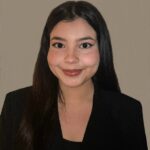
Lucia Posada-Reyes
Lucia Posada-Reyes, a Molecular, Cellular, and Developmental Biology student at USC, conducted research under the mentorship of Dr. Fumito Ito. Her project, The Influence of Sun Exposure Across Ages and Genders: Assessing Its Role in Skin Cancer Risk, explored how early-life UV exposure habits, sunscreen misuse, and behavioral patterns contribute to rising skin cancer rates, particularly among non-Hispanic white women and older men.
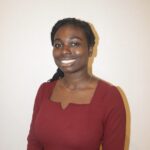
Mabel Frimpong
Mabel Frimpong, a Neuroscience major at Bryn Mawr College, worked in the Dr. Adam De Smith Lab. Her project, Analysis of a Putative Novel Risk Locus for Acute Lymphoblastic Leukemia in Children with Down Syndrome, investigated the role of the TPX2 gene on chromosome 20 in the development of leukemia in children with Down Syndrome using droplet digital PCR (ddPCR).

Michelle Yu
Michelle Yu, a Health Promotion and Disease Prevention student at USC, contributed to cancer survivorship research under Dr. Miller’s mentorship. Her projects included a literature review on environmental exposures and late effects in childhood cancer survivors, recruitment for the Health and Community in Asian Americans (HACAA) study, and research on cultural influences on mental health outcomes in Asian American survivors, culminating in a poster submitted to ABRCMS 2025.

Natalia Gerovian
Natalia Gerovian, a Biological Sciences student at UC Santa Barbara, investigated the transcription factor SPDEF in prostate cancer under the mentorship of Dr. Suhn Kyong Rhie. The experience allowed her to develop key laboratory skills and broaden her exposure to translational cancer research.
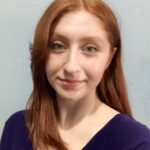
Scarlet Affa
Scarlet Affa, a Chemistry major at UCLA, interned at Children’s Hospital Los Angeles under the mentorship of Dr. Liya Xu. Her project, Characterization and Functional Annotation of Germline RB1 Variants from Peripheral Blood Mononuclear Cells in Retinoblastoma Patients, analyzed the genetic landscape of retinoblastoma in more than 240 patients, solidifying her interest in ophthalmology and rare pediatric diseases.

Shannon Liang
Shannon Liang, a Chemical Engineering student at USC, interned in Dr. Nicholas Graham’s Lab. Her project, Testing the Potential Cytotoxic Effects of a VDR Agonist on Temozolomide-Resistant Glioblastomas, examined whether Vitamin D Receptor agonists could reduce MGMT expression and enhance treatment effectiveness in glioblastoma, the most common brain cancer in adults.
2024
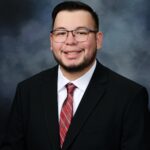
Benjamin Alonzo
Benjamin Alonzo, studying Human Biology at USC, interned in Dr. Adam De Smith’s Lab and worked on a project focused on Acute Lymphoblastic Leukemia.
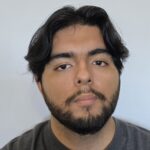
David Maguellal Jr
David Maguellal Jr., a Biochemistry major at California State University–Northridge, gained valuable research training through this internship under the mentorship of Dr. Sandra Algaze. His work introduced him to laboratory research practices and helped shape his future career interests in the biomedical sciences.

Laila Ward
Laila Ward, a Human Biology major and Law and Social Justice minor at USC, conducted research on breast-to-brain cancer metastasis focusing on biomarkers of tumor microenvironment colonization under Dr. Josh Neman’s mentorship. In recognition of her work, she was awarded the ACS Trailblazer Award in 2025.

Lucia Miguel
Lucia Miguel, a first-generation student at California State University–Northridge, explored health disparities in cancer research under the mentorship of Dr. Albert Farias. Her project deepened her understanding of systemic inequities in healthcare and reinforced her commitment to improving health outcomes in marginalized communities.
2023
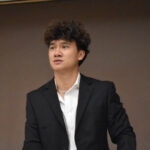
John Tran
John Tran is a first-generation graduate dedicated to improving healthcare access for refugees and underserved communities. With a passion for addressing healthcare disparities, he is committed to driving meaningful change and advocating for equitable care to uplift and empower those in need through advancements in AI-driven healthcare research.
